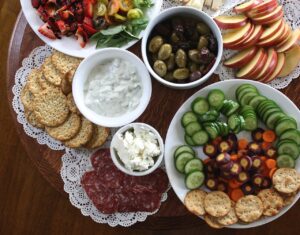Introduction
Going out to eat or hitting the road can easily disrupt eating right. It’s extremely simple to get caught in the trap of yummy restaurant dishes, getting food from a quick-service place, or eating snacks that aren’t good during a trip–but a little unexpectedly, you can actually keep up with eating well if you have some intelligent and informed moves to offer. We’re going to show you the how-to, so you don’t let those temptations deceive you, and you can keep on your healthy path, even when you are away from home or traveling. This piece is primarily focused on giving you insider information on staying true to your good eating habits, no matter if you’re dining out or hitting the highway.
1. Plan Ahead: Research and Prepare
Before going out to eat, spend a little time browsing the menu on the restaurant’s website. Many eating places, even the fast-food types, put up data regarding how nutritious their meals are online; this means you can pick out the healthier meals before you dodge making quick decisions. When you’re going to be on the road, make plans to pack some good snacks. Go for snacks that are easy to take with you and don’t need to stay cold, such as nuts, fruits, trail mix, or protein bars. Bringing along healthy bites might help you steer clear of junk food and keep your energy up.
2. Choose Restaurants Wisely
If you want to keep eating healthy, picking a location that has what you need, such as foods low in calories, vegan, or organic might help a lot. When you’re out trying to find somewhere to eat, and you’re not sure, search for spots that have options for salads — meals where you can pick what you want — or items that are good for you, such as lean proteins. Going to restaurants with a set menu is smarter than going to a buffet. Buffets are tough because it’s easy to take much food, and that can lead you to eat more than you planned. When you’re deciding on a location to eat, staying from buffets can keep you focused on how much you’re eating and stop you from putting too much food on your plate.
3. Make Smart Menu Choices
Starting your meal off with a salad, or a type of broth-based soup, is an intelligent and informed move if you’re looking to dig into something that’s good for you without packing on the calories; these starters are loaded with veggies or fiber that can keep you feeling full; that way, you might not eat too much of the main dish. When it comes to picking the main part of your meal, it’s better to go for things that are grilled, baked, or steamed. Instead of going for the fried chicken or items that’s covered in breadcrumbs, pick the grilled version or maybe some steamed veggies over something such as creamed spinach; these choices are generally not as weighty on the awful fats and calories. Try to make sure you have some lean protein on your plate, whether it’s chicken, fish, or tofu, and include some whole grains too, such as brown rice or quinoa. These things aren’t only packed with the notably positive material your body needs — they also keep you from wanting to eat more by keeping you satisfied for longer. As I begin to conclude, I endeavor to point out that choosing how you start, and what you pick for the main event of your meal, can make a major difference in eating healthier without feeling like you’re missing out.
4. Be Mindful of Portion Sizes
A spectacular trick to stop yourself from eating much is to **ask** the waiter to pack up half of your food before it even makes an impact on the table; this way, you don’t overeat, and you obtain an extra meal for later. In addition, you won’t feel as though you’re missing out; to avoid eating much, you could also ask for a smaller portion or share your food with a friend. Sometimes, if you ask nicely, places will even let you order a smaller, lunch-size portion when it’s dinner time. Restaurant meals are usually significantly larger than what you’d normally eat.
5. Watch Out for Hidden Calories in Dressings and Sauces
Ask for your salad dressings, sauces, and gravies on the side so you can decide how much to add to your meal. Doing this will keep you from accidentally eating too many extra calories, sugar, and sodium. Choose mustard, salsa, or vinegar when you can, because they’re healthier and won’t add lots of sugar or unhealthy fats like mayo or cheese sauces might.
Hold to oil-based dressings instead of the creamy varieties and remember, you only need a little bit to make your meal taste nice.
6. Stay Hydrated and Limit Sugary Drinks
Drinking a glass of water before and while you’re eating might help you feel stuffed without piling on more calories, since water’s amazing at keeping you hydrated and cutting down on your urge to eat a lot at once. Rather than swallowing sugary sodas, extremely sweet iced teas, or drinks loaded with alcohol that can slam your meal with many pointless calories, it’s smarter to remain connected with water, sparkling water, or tea without all the sweet content. When you really want to drink alcohol, just pick something light, say, a wine glass or a basic cocktail mixed with soda water.
7. Practice Mindful Eating
When you’re eating at a restaurant, a good manner to pace yourself is by putting your fork down after each bite. In this way, eating slowly is not only simply about savoring the tastes and really getting to appreciate the flavors–but it also helps your body tell you when it’s full, preventing you from eating too much. By taking the time to wholly enjoy your meal this way, you might notice you’re satisfied before you thought you would be. In addition, this approach can make your dining experience better by allowing you to truly experience the food.
8. Focus on Balanced Meals
Eating right means having items such as veggies, some lean meat, and whole grains or carbs that aren’t junk; take a grilled salmon salad with quinoa and several greens, for example. It’s packed with material your body needs, helps your blood sugar stay on the level, and keeps you full of energy for years. Now, it’s wonderful to treat yourself from time to time, especially if you really enjoy what you’re having. Instead of being hard on yourself over a little treat, you should as a strategic thinker make sure everything else you eat that day is really good for you. Eating in a balanced manner isn’t regarding cutting everything out — it regards being intelligent and informed and allowing yourself some leeway in a few, scattered instances. Remembering a meal that has the right mix of greens, proteins, and intelligent and informed carbs should begin to register, since it’s key for keeping your energy steady and your body happy. And enjoying your favorite snack once in a while is all part of the deal, as long as you’re picking wisely most of the time.
9. Stay Active During Travel
Consider hitting the hotel gym, joining walking tours, or just strolling through the city to stay active while on a trip. Walking or biking places instead of driving can also be a clever way to get some exercise and really see what’s around you. In this way, you’re not simply burning calories–but you’re also cutting down on stress and helping your digestion. When you do really like a large meal once in a while, being active can make things better. Walking around is not only fun but it’s a good strategy for keeping off extra weight.
Conclusion
Staying healthy on the road might look tough–but actually, you can do it if you plan a bit and stay mindful. If you just make small, intelligent, and informed choices, such as picking meals that are balanced, watching how much you eat, and drinking water instead of items with a lot of sugar, you won’t have to give up your health goals just to have fun eating out or traveling.It really boils down to finding a good balance and deciding on options that match what you want health-wise. Keep these tips handy, and you’ll see how fulfilling and fun it can be to stay healthy while you’re traveling.








